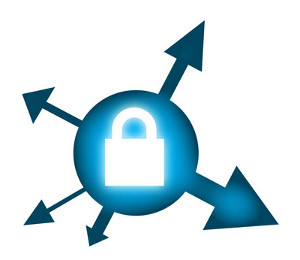Why you should be using HTTPS
Published on

The EFF’s HTTPS Everywhere logo
One of my favourite hobbyhorses recently has been the use of HTTPS, or lack thereof. HTTPS is the thing that makes the little padlock appear in your browser, and has existed for over 20 years. In the past, that little padlock was the exclusive preserve of banks and other ‘high security’ establishments; over time its use has gradually expanded to most (but not all) websites that handle user information, and the time is now right for it to become ubiquitous.
Why use HTTPS?
There are numerous advantages to using HTTPS, both for the users of a website and for the operator:
Privacy
The most obvious advantage is that HTTPS gives your users additional privacy. An insecure (HTTP) request can potentially be read by anyone on the same network, or the network operators, or anyone who happens to operate a network along the path between the user and the server.
Users on shared WiFi networks (such as those in coffee shops, hotels, or offices) are particularly vulnerable to passive sniffing by anyone else on that network. If the network is open (as is frequently the case) then anyone in radio range can see exactly what the user is up to.
Integrity
HTTPS also helps to maintain the integrity of your site. With a plain HTTP request, there’s nothing to stop anyone in between the server and the user from modifying the content of the request or the response. This is a frequent tactic used by annoying WiFi gateways (such as the ones you’d find in a hotel), dubious ISPs who want to serve you extra adverts, or just plain old nefarious attackers.
If you’re trying to convey some kind of information to users (and if you aren’t, why exactly are you running a website again?) it seems beneficial to both you and them if the information arrives as you intended, rather than in a modified form due to someone or something tampering with it.
Security
If your website has any kind of authentication, or session identifiers, it becomes extremely vulnerable to an attacker monitoring the traffic and stealing the credentials. This was starkly demonstrated in 2010 when Firesheep was released. This tool allowed anyone to quickly and automatically hijack social media accounts of anyone on the same network who was using HTTP to access them.
Even if your login pages are served over HTTPS, if you send a single session ID cookie over HTTP (such as a page you decided wasn’t particularly ‘important’) then an attacker can probably spoof the user’s session and gain full access to their account. Again, in the case of open WiFi networks that could be anyone in radio range.
Search engine rankings
Some search engines use HTTPS as a signal in their ranking algorithms. Google announced in 2004 that it was using the presence of HTTPS as a small positive signal, but that it may strengthen that signal over time as more and more websites switch to using a secure transport. It’s not unthinkable that at some point in the future there will be HTTPS-only search engines.
But… But… But…
There are lots of excuses for not implementing HTTPS. Most of them are either misguided or outdated.
It’s too expensive and/or complicated
In the past, getting HTTPS certificates was a pain. A number of free suppliers have existed for a while but the process for getting their certificates wasn’t particularly straight forward, and many imposed arbitrary restrictions on the certificate parameters. Even once you had the certificate, you had to fiddle about with your HTTP server configuration to make it work, remember to manually get a new certificate when the old one expired, and lots of other annoying busywork.
With the arrival of Let’s Encrypt, all that changed. You can retrieve and deploy a free HTTPS certificate with two or three commands. Renewal can be handled completely automatically with a single command executed by cron.
There’s no point; nothing on my site is sensitive
You might not think your content warrants privacy, but can you speak for everyone who accesses it? Even content that seems mundane to you — such as travel advice, or technical writing — could be used to build up a profile of a user. If an attacker is monitoring traffic in a coffee shop and sees a user looking at travel advice and weather forecasts for a foreign country, he could use that information to plan a burglary knowing that the user will be away. Similarly, some content which is perfectly mundane to you may actually be very sensitive in other countries with repressive governments. HTTPS makes it much harder for these people to snoop on traffic.
From another angle, if you’re offering any kind of information, instructions, or especially file downloads, there’s a severe risk to users if the content is modified on its way to them. An evil sysadmin could rewrite your travel advice to suggest visiting the local drug dealer’s hangout, or replace your download with a malware-infested version.
HTTPS is slower, uses more resources, etc
Back in 1995 this might have been a valid argument. Enabling HTTPS on a modern server will make an almost negligible difference to performance. If you also enable HTTP/2 (which most implementations only support over HTTPS), it’s likely to actually use fewer resources, and result in a faster, smoother experience for your users. HTTP/2 was designed to work with HTTPS, and designed with modern requirements and networking techniques in mind.
CloudFlare have an excellent demonstration of the benefits of HTTP/2, and it can show speed improvements of 2-3x in a typical environment. On top of being faster, HTTP/2 uses fewer connections which results in less resource overhead on both the server and the client.
So what are you waiting for?
If you run a website and aren’t using HTTPS, give it a try.
Have thoughts that transcend nodding? Send me a message!
Related posts

HTTP/2 and TLS Server Name Indication
I was recently alerted to a bug in Centauri, a simple reverse proxy I wrote. The initial report was that it was serving completely the wrong website, but only sometimes, and it behaved differently in different browsers, and no-one else could reproduce it. I use Centauri for all of my web-facing services (including this site!) so it’s a little surprising such a major bug would have escaped my...

Reverse engineering the Sense API
Sense is a little device that sits by your bedside and, in conjunction with a little ‘pill’ attached to your pillow, monitors your sleeping patterns and any environmental conditions that might hamper them. Android and iOS apps show you your sleep history, and offer suggestions for improvements. Sense was Kickstarted in August 2014, raising over 2.4 million US dollars, and shipped to ba...

Avoiding the Consequences of Dumb Laws with Tailscale
More and more sites are implementing privacy-invading age checks or just completely blocking the UK thanks to the Online Safety Act. Protecting kids from some content online is certainly a noble goal, but the asinine guidance from Ofcom, threats of absolutely disproportionate fines, and the stupidly broad categories of content have resulted in companies just giving up or going through a tick-box e...
{% figure "left" "The EFF's HTTPS Everywhere logo" %} One of my favourite hobbyhorses recently has been the use of HTTPS, or lack thereof. HTTPS is the thing that makes the little padlock appear in y...